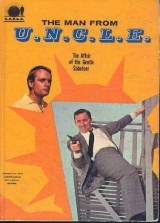
Текст книги "[Whitman] - The Affair of the Gentle Saboteur "
Автор книги: Brandon Keith
Жанры:
Боевики
,сообщить о нарушении
Текущая страница: 6 (всего у книги 6 страниц)
"So we'll get to him."
"Will you? They may have a time schedule. If too much time elapses, they know there's trouble; they sacrifice what they have to leave behind and take off."
"So? Still we've won our battle—with no casualties on our side." McNabb was old, patient, wise. "Let's leave it to the Old Man's reinforcements." He grinned. "They'll storm the castle."
But Mr. Solo was young. "An onslaught—and Number One gets scared off. There's a house there somewhere inside, and we don't know how many eyes are in there watching. Me, they're expecting, and just like this—the barefoot boy in swim trunks. And they know who I am—Burrows talked to me—Napoleon Solo. Me, they're expecting; I'm after Number One. I'm going in, McNabb, and I've got to go alone."
"Napoleon, wait! Listen to me; I'm an old hand. You go in there now, and it might be we'll carry you out feet first. You're a bright young guy, and you've got a long career ahead of you. Who needs you dead?"
"I'm going in, Mac. I appreciate what you're trying to do, and I do thank you, but your concern is for me and not the overall. You know as well as I do, probably better, that this is the right moment, and it may never happen again. They're expecting me, all dressed up—or undressed—as I am. If ever there's an opportunity to catch up with Tudor, it's now, and they themselves have shaped me up as the guy to do it."
"Talk to the Old Man on the two-way."
"He's more of a papa rooster than you. His major concern is his flock and you know it. He'll call me off—and from the Old Man it's an order. From you it's advice. Mac, if you were in my spot, wouldn't you go in?"
McNabb was silent.
"Wish me luck, McNabb."
"Good luck. Take a gun."
Solo laughed. "Where'll I hide it?"
"Yeah," McNabb grunted.
"I've got better ammunition than bullets. I've got facts. I'm not going in for a kill. I'm hoping to bring Tudor out. Facts, if I can get through. If I can talk to him, I may be able to bring him out. The old story–self-preservation. I'll tell about our reinforcements–an attempt at escape can mean death. The other way, prison; but prison, you're still alive. I'll tell him we've got Stanley, Burrows, the girl. I'll tell the truth—to save their skins they'll testify against Tudor; to get lesser sentences they'll testify that Tudor's the boss, the architect of the schemes of attempted sabotage and actual kidnapping, but none of that carries a penalty of death. Prison, there's always hope; there's precedent all the way back since that guy with the U-two. Governments will release and exchange political prisoners. I'm going in, McNabb."
"Go, boy."
"Protect my flanks."
"You can bet on that."
Solo passed through and McNabb closed the gate.
Protect the flanks. You can bet on that, kid.
When the others came they would have to wait this side of the gate.
A horde, no matter how subtle the invasion, could mean quick death for Solo.
Perforce this was Solo's adventure, alone. McNabb sighed and stood, a watcher at the gate, as lonely on this side as Solo on the other.
14. Turnabout
HE WALKED IN the heat on the hot pebbles. It seemed such a long time since the operation had begun; since McNabb had discovered Stanley at the airport so much had happened, events tumbling upon events. Now his feet dragged, and there was a heaviness in him, an exhaustion. He realized it was not physical fatigue; it was relief, a letdown, the weight of an emptiness. He had not admitted, not even to himself, how terribly anxious he had been about Illya. And he had worried about the Old Man, and the young boy, and the failure of UNCLE with Stanley, the disgrace—they had all avoided discussion of that—at having to release a dangerous criminal whom at last they had apprehended. But mostly it had been the worry about Illya, his friend for so long. Now Illya was safe, and now he felt the accumulation of all the worry, now it was upon him, the letdown, the fatigue of relief. He shook it off. He braced his shoulders, breathed deeply, filled his lungs. He thought about himself, his immediate mission, and it helped. The fact that he himself was approaching possible peril gave him an excitement and served as an antidote to the exhaustion. Suddenly, as though the elements were assisting in his recovery, it was cooler. There was a little breeze from the east, and he smelled the fresh salt-wet of the sea skimmed off the top of the ocean and carried by the breeze. He walked more quickly, alert, watching.
The pebbled road curved. There were trees and foliage, wide green lawns with marble benches, flowers, trimmed hedges, and bushes with red-blooming roses. Above, the sky was pure blue, cloudless, and the sun, westerly now, was a burning orange ball. The salt smell of the ocean mingled with the perfume of the roses; it was quiet, fragrant, peaceful. There was no sound except the pleasant chattering of the birds. He walked for a long time, perhaps a quarter of a mile, until the pebbled roadway curved to the house, a red brick mansion with a portico of tall white columns. He walked up five white marble steps into the cool shade beneath the roof of the portico and rapped the gold knocker of a wide white door. There was no answer. He opened the door and entered.
Cool, silent.
He padded, barefoot, through the rooms.
"Hello," he called. "Hello!"
There was no answer except his own voice coming back to him in echoes. He went all the way through and out the rear and saw the helicopter. It was resting on a smooth beach of packed white sand. Beyond the helicopter the ocean was gray, flat, calm, with little wavelets lapping at the sand of the beach. Inside the helicopter a woman was leaning out an open window. She was attractive, smiling, and tanned from the sun; she had gleaming white teeth, dark eyes, dark hair.
"Please come closer!"
He obeyed for two reasons: First, he wanted to come closer, and second, and more imperative, a thick black gun was pointed at him, and she was holding it very competently. The sand squeaked beneath his feet, and then he was at the helicopter looking up at her.
"Where are the others, Mr. Solo?"
He squinted behind the dark glasses. "You know me?"
"I've seen photographs. Stupidly, there are many of them." She had a low-pitched, harsh voice, and spoke clearly, precisely, and with authority. "Where are the others?"
"Tell Leslie Tudor I want to talk to him."
"You are talking to Leslie Tudor."
A woman! Amazement prickled at his scalp!
"Surprised, Mr. Solo?"
He nodded, gulped. "To say the least—yes."
"So much for that, for all the good it will ever do you. Now quickly, please. Where are they?"
"We have them."
"You what?"
"We have them, Miss Tudor."
"You haven't!"
"Stanley, Hunter, Burrows."
"The truth, Mr. Solo!"
"And Kuryakin and the boy."
"No!"
"But, yes, Miss Tudor."
"You're lying!"
"Gospel truth, Miss Tudor."
"But—but—how?"
The sun was hot on his back, but from the ocean the breeze was cool. The little wavelets swished quietly, musically, at the edge of the beach.
"You put too much pressure on a youngster. You didn't let the wine ferment enough, putrefy to rotten vinegar. You put too much pressure on her too soon; she wasn't spoiled enough yet, rotten enough to join in cold-blooded, useless, evil, multiple murder."
"Incompetent infant!"
"She defected, Miss Tudor, and she brought out young Winfield and Kuryakin with her."
"And Stanley? Burrows?"
"Taken by us. Intercepted by our people."
"Then why you?"
"Pardon, Miss Tudor?"
"Why are you here?"
"To take you out."
"Not on your life!" The gleaming teeth were still exposed, but it was no longer a smile; it was a leer of hatred, bared teeth, a silent snarl, the jaw stiff, the muscles at the corners quivering. "Not ever in your life, Mr. Solo."
"There are many men gathering outside the gates. I came in alone for your safety." It was a reasonable statement. He would use any statement, any ruse, any argument, to accomplish his mission. He wanted her surrender. "Many men, many temperaments," he said. "One of them might have an itchy trigger finger."
"Thank you for nothing, Mr. Solo."
Solo bowed his head as though modestly accepting a compliment.
"Will you put away that gun and please come with me?"
"You're out of your mind!"
"Miss Tudor, you'll get a fair trial. There are always two sides to any question. THRUSH is rich enough to provide you with the finest lawyers. There may be technical loopholes, and you might win at a trial. If you win, you're scot-free; if you lose, you get a jail sentence, but prison isn't death. In time, you're out, you're free. I repeat—please put away the gun and come with me."
"And I repeat—you're insane."
"Would you tell me why you think so, Miss Tudor?"
"Gladly. And then we'll be done with this." She leaned out farther, steadily holding the gun pointed directly at his head. "Mr. Solo—charming, handsome, debonair Mr. Solo—you're a fool! I am Leslie Tudor! I'm not Burrows or Stanley or that little pipsqueak Pamela Hunter. I am Leslie Tudor! Don't you think I anticipated the possibility—this which is happening right now? Why do you think I'm out here in this aircraft?"
"Why, Miss Tudor?"
"Because I touch a button of this machine and it is up and out and over the Atlantic. In moments, literally moments, I am in the air and away, out of the territorial jurisdiction of the United States. What can you do, any of you? Shoot down a British plane in free air over international waters? That is an act of war! You wouldn't dare, any of you! I challenge you! Is UNCLE an outlaw organization? Would it effect an act of war upon a friendly country no matter the alleged—and as yet entirely unproven in any court of law—would it effect an act of war under these alleged circumstances? I ask you, Mr. Solo. Is UNCLE an outlaw organization?"
"No." Perhaps he should have listened to McNabb, wise old McNabb. Perhaps he should have waited and gone in with the others. Then they would have had her, within the territorial United States, a criminal alien bent upon conspiracy within the United States and subject to United States law. But would she have waited? How long would she have waited, her time schedule having lapsed? Had he been right in going in at once, alone? Or should he have waited? It was a question that would remain forever unanswered.
Leaning out through the open window she stared down at him, silently regarding him. He knew of her satisfaction, how much she was enjoying his consternation, how she was savoring at least this crumb of THRUSH's victory. And there was nothing he could do. He could not make a move. He was helpless against the wide round muzzle of the thick black gun unswervingly pointed at his head. Any action on his part, any sudden move, and the gun would spew forth its lethal charge, and death would end all hope.
What hope?
And then, suddenly, there was hope.
She laughed—shrill, tremulous, spiteful—and it gave him hope. She was not done yet.
"Failed in our mission"—the harsh voice rasped in an anger, a futility—"but for me at least, a booby prize."
Solo pulled up the corners of his mouth, forcing a smile.
"What last prize can I give you, Miss Tudor?"
"You're not giving me! I'm giving you!"
"A prize for me, Miss Tudor?" Hope fluttered. Keep her talking. Let's see what happens. "A prize? A memento, perhaps? A token of our meeting?" He played along with it, played it stupid. "But didn't you say for you—a booby prize for you?"
"A prize for both of us, Mr. Solo."
"Well, thank you, Miss Tudor."
The harsh voice now snapped an order: "Take off your glasses, Mr. Solo!"
And Solo, quite mildly, pretending stupidity, frowning inquiringly, responded, "Beg pardon, ma'am?"
"The great Mr. Solo. The vaunted Mr. Solo. I want to see your eyes, Mr. Solo. Courage or fear? Take off your glasses. You have seen me, you know me, the only one of UNCLE thus far—but not for long. Take off your glasses. Courage or fear in the face of the inevitable? It must happen, sooner or later, to all of us. I'm curious about you. Let me look in your eyes, Mr. Solo, as I present your prize—a prize for both of us. Let me look at your eyes as they look on—death."
His smile, no longer forced, was grave.
"Yes, ma'am," he said.
He opened his arms, bowed politely, straightened, looked up at her, direct, exact, moving his head slightly, arranging the line of vision.
"I'm waiting, Mr. Solo."
"As you wish."
His right hand came up like a salute to the right temple of the glasses, his index finger pressed to the hidden spring, and a tiny dart was released. A slender streak gleamed in the sunshine. Suddenly she was rigid, her eyes round in wonder; then she hung limp in the window, unconscious. The gun slipped from her hand and soundlessly met the sand.
It was over. It was ended.
Solo sighed and went back through the house and the long way over the pebbled road to McNabb and the many men now gathered.
Table of Contents
1. The Quarry
2. Dinner With the Old Man
3. A Morning Stroll
4. The Gentle Saboteur
5. "No Way Out"
6. "Two Trumps"
7. Game Without Rules
8. The Living Beacon
9. "A Crazy World"
10. Rendezvous
11. "Mistake in Judgment"
12. Change in Plans
13. "Two-Gun McNabb"
14. Turnabout








